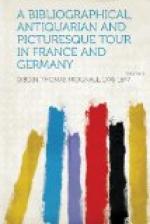Foremost in the
bands of France,
Arm’d with
hauberk and with lance,
And helmet glittering
in the air,
As if a warrior
knight he were,
Rush’d forth
the MINSTREL TAILLEFER
Borne on his courser
swift and strong,
He
gaily bounded o’er the plain,
And raised the
heart-inspiring song
(Loud echoed by
the warlike throng)
Of
Roland and of Charlemagne,
Of Oliver,
brave peer of old,
Untaught
to fly, unknown to yield,
And many a Knight
and Vassal bold,
Whose hallowed
blood, in crimson flood,
Dyed
Roncevalle’s field.
[150] M. Denon told me, in one of my visits to him
at Paris, that by the
commands of Bonaparte, he
was charged with the custody of this
Tapestry for three months;
that it was displayed in due form and
ceremony in the Museum; and
that after having taken a hasty sketch of
it, (which he admitted could
not be considered as very faithful) he
returned it to Bayeux—as
it was considered to be the peculiar
property of that place.
[151] See p. 109 ante.
LETTER XVI.
BAYEUX TO COUTANCES. ST. LO. THE CATHEDRAL
OF COUTANCES. ENVIRONS.
AQUEDUCT. MARKET-DAY. PUBLIC LIBRARY.
ESTABLISHMENT FOR THE CLERGY.
I send you this despatch close to the very Cathedral, whose spires, while yet at Bayeux, were already glimmering in the horizon of my imagination. The journey hither has been in every respect the most beautiful and interesting that I have experienced on this side the Seine. I have seen something like undulating pasture-lands, wooded hills, meandering streams, and well-peopled villages; and an air of gaiety and cheerfulness, as well as the charm of picturesque beauty, has accompanied me from one cathedral to the other.
I left the Hotel de Luxembourg, at Bayeux, in a hired cabriolet with a pair of horses, about five in the afternoon, pushing on, at a smart trot, for ST. LO: which latter place I entered by moon-light. The road, as usual, was broad and bold, and at times undulating; flanked by beech, elm, and fir. As I just observed to you, I entered St. Lo by moon-light: the double towers of the great cathedral-like looking church having a grand and even romantic effect on approaching the town. An old castle, or rather a mere round-tower relic of one, appeared to the left, upon entering it. Passing the porch, or west end of the church, sometimes descending, at others ascending—midst close streets and overhanging roofs of houses, which cast a deep and solemn shadow, so as to shut out the moon beams for several hundred yards—and pursuing a winding route, I at length stopped at the door of the principal hotel—au Grand Coq! I laughed heartily when I heard its name; for with the strictest adherence to truth the adjective ought to have been petit!




